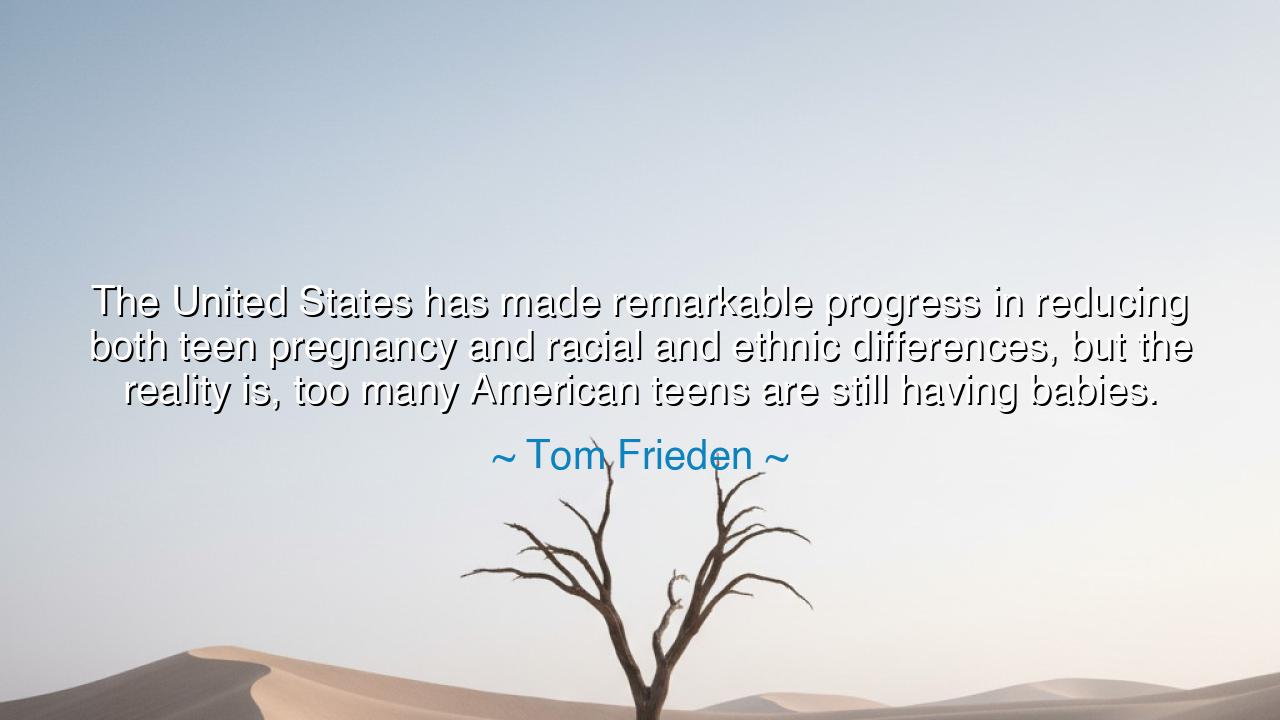
The United States has made remarkable progress in reducing both
The United States has made remarkable progress in reducing both teen pregnancy and racial and ethnic differences, but the reality is, too many American teens are still having babies.






Hearken, O children of the future, to the words spoken by Tom Frieden: “The United States has made remarkable progress in reducing both teen pregnancy and racial and ethnic differences, but the reality is, too many American teens are still having babies.” This is no idle utterance, but a mirror held up to society, showing both its triumphs and its lingering burdens. In his words, there is both victory and sorrow: victory in the great strides made, sorrow in the battles yet unfinished. For progress is never complete until wisdom and discipline dwell in every heart.
The ancients would remind us that no nation is judged by its might alone, but by how it safeguards its young. To guide the youth is to guard the future, for the young are the seeds from which tomorrow springs. A harvest planted in haste, before its time, bears fruit that burdens rather than sustains. Thus the matter of teen pregnancy is not only a question of numbers and charts, but of destiny, of lives shaped before they are ready, of dreams deferred before they can unfold.
Yet let us not pass lightly over the triumphs. Once, not so long ago, teen births were far more frequent, and despair seemed to linger especially heavy upon communities marked by racial and ethnic differences. Through teaching, through public health campaigns, through voices of parents, educators, and doctors, progress was carved from stone. Like ancient builders raising a temple, society laid stone upon stone, reducing inequalities, spreading knowledge of health, and bringing forth greater equity. This is the “remarkable progress” Frieden speaks of, the rising sun after long night.
Still, shadows remain. Consider the tale of a young girl named Maria, whose story echoes across towns and cities. She was bright, a singer in her church, her teachers spoke of her promise. Yet at sixteen, her path was altered: she bore a child. Her spirit was not broken, but her journey grew heavier. She rose each dawn to feed her baby before school, studied by candlelight after chores, and pressed forward with fierce courage. Maria’s story shows us both the danger and the hope: that early motherhood strains the shoulders of the young, yet also that resilience may still shine. But should we not labor to spare her that burden until her season was ripe?
So the quote is both trumpet and warning. It celebrates the victory over despair, but warns that too many teens are still having babies, and thus, the work is not finished. Like a general whose army has won the field but not yet secured the peace, we must remain vigilant. For each child born too early to a parent unprepared, both lives risk poverty of opportunity. And when many such lives are bound in hardship, the nation itself stumbles.
What lesson then shall we carry? That progress is never enough until it touches every soul. That to reduce inequities is noble, but to eliminate preventable suffering is greater still. The wisdom of the elders is this: prevention is not scolding, but guiding; not condemning, but educating; not neglecting, but empowering. To offer knowledge, compassion, and access to care is to offer freedom—the freedom to choose one’s time, one’s path, one’s destiny.
Therefore, let all who hear these words act. Teach the young honestly about life, love, and consequence. Support them with truth, not silence; with opportunity, not neglect. Let communities rise together to make healthcare, education, and mentorship accessible to all, so that no youth need stumble in darkness. In doing so, we honor both the progress already made and the unfinished labor that remains.
And so I say: remember the words of Frieden not as a cold report, but as a call. Progress is a mighty river, but without vigilance, it may stagnate. Let us keep it flowing—until not “too many,” but none at all, are lost to a burden they were not yet meant to bear.






AAdministratorAdministrator
Welcome, honored guests. Please leave a comment, we will respond soon